
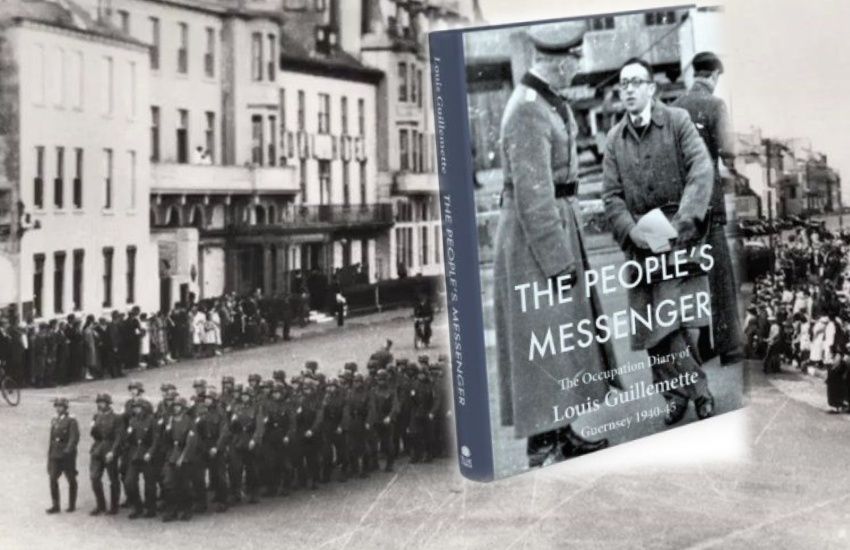

A former H M Greffier and Occupation historian will give a talk to a sell-out audience tonight to launch the publication of the finest first-hand account of the island's administration during the Second World War.
Ken Tough has been instrumental in the publication of 'The People's Messenger'. The book, published by local publisher Blue Ormer, is the Occupation diary of the late Louis Guillemette, who served as the Secretary to the President of the Controlling Committee, which ran the States during the Occupation, and who became the main interlocutor between Guernsey’s leaders and the German occupiers.
Ahead of the talk, Express spoke to Mr Tough about the diary and to two of his partners in the work to get it published: Louis Guillemette's daughter, José Day, and former Bailiff Sir de Vic Carey, grandson of Sir Victor Carey, who was Bailiff during the Occupation.
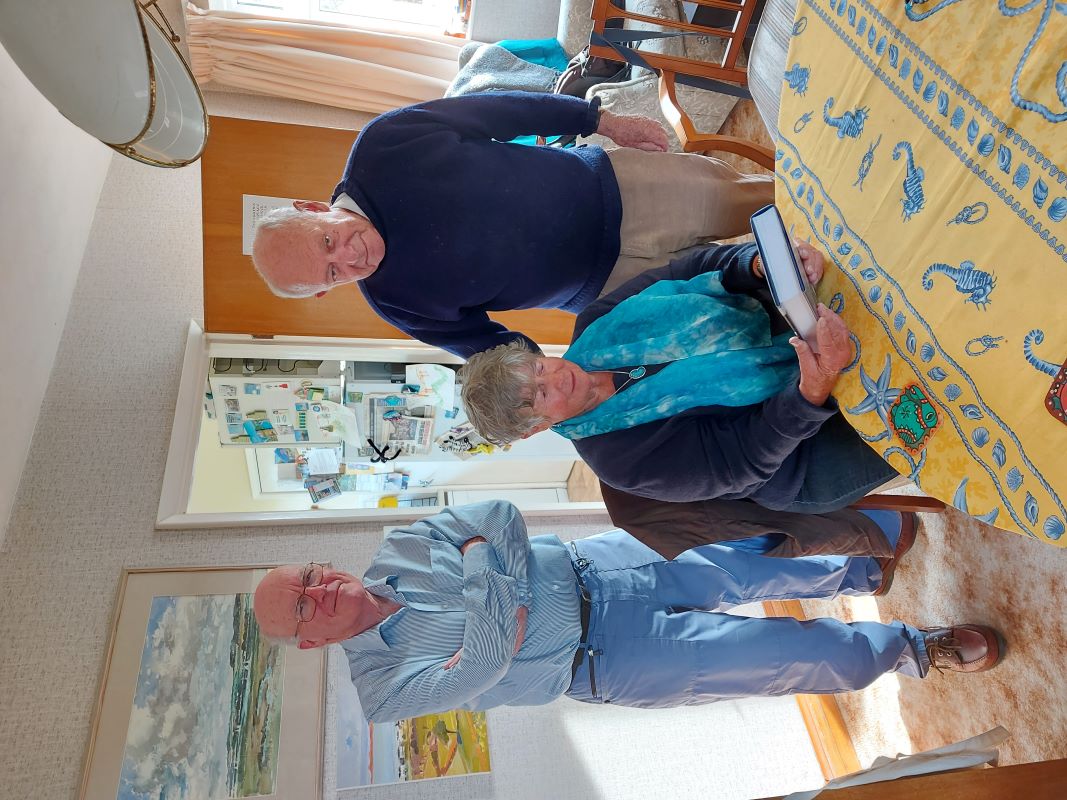
Pictured: Ken Tough (left), José Day and Sir de Vic Carey with The People's Messenger, which is published today.
Mr Tough showed Express the original diary, which was typed and kept hidden from the occupiers and has been seen by very few people since.
"It's in three folders and even they have a story to tell," said Mr Tough.
"Louis reused some old folders which he found available in the office at the time of the Occupation. They happen to relate to the States' compulsory purchase of the reservoir site, which by 1940 was history, and of course they had the advantage that they didn't appear to be containing a diary. Anyone coming across the folders would probably think they were just old administrative records."
But, in fact, they contained the most riveting and revealing day-to-day account of how the island was governed in occupation, in particular from April 1942 until the week before Liberation on 9 May 1945, told by the man who, perhaps more than any other, was at the very centre of events throughout the period.
"You've got references in the diary to Louis being in the Elizabeth College building at the time of the German bombing of the island," said Mr Tough.
"They are all taking shelter down in the basement. And he was present during that famous telephone call between Ambrose Sherwill [the first President of the States' Controlling Committee] and the Home Office just before the bombing raid began.
"Suddenly, the bombers appear, and Sherwill says 'the Germans are bombing now - you can hear them' and he picks up the phone and puts it to the window. Louis Guillemette is in the room at that time."
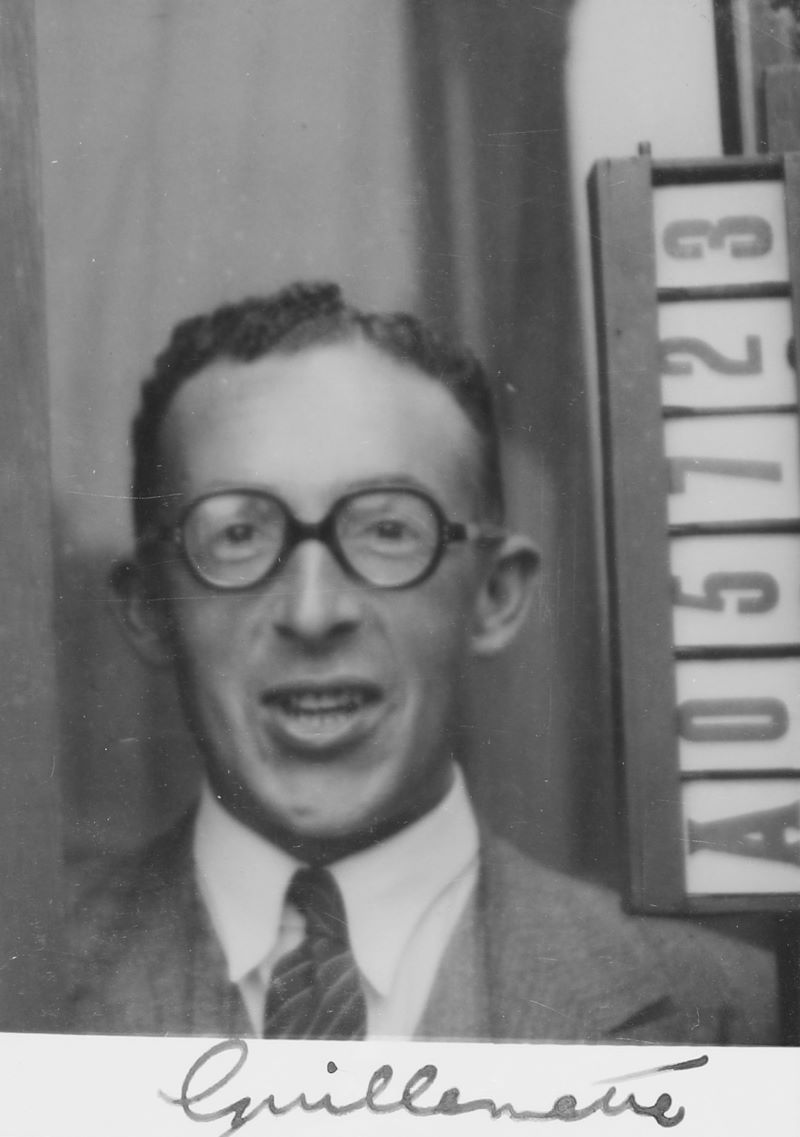
Pictured: Louis Guillemette's wartime ID photo. Credit: Island Archives.
Mr Guillemette was only 30 when he was appointed Secretary to the President of the Controlling Committee. This was soon after he had played a key role organising the Evacuation.
"You've got the Evacuation going on - over 19, 20 and 21 June - and, at the same time, a plan is put to the States to set up the Controlling Committee. No sooner had Louis put down his pen from helping to run the Evacuation, then you've got this new system of government being created," said Mr Tough.
"The States' Supervisor [the most senior civil servant] does not really play a key role in that. Instead, you've got this new boy on the block - the Assistant Secretary to the Bailiff, Louis - suddenly being pitched in as the Secretary to the Controlling Committee, an entirely new body with entirely new powers.
"He must have proved his worth to Sherwill. He’d already shown his ability. In the Bailiff’s Office, he’s not just arranging Royal visits and sending out invitations and publishing Billets. He’s actually involved in pretty major negotiations, especially during the early period of the war."
Mr Tough found that the diary shed new light on an aspect of the Occupation which often escapes attention: the relationship, which was not always easy, between the islands of Guernsey and Jersey.
The diary itself is 274 pages. It is supplemented by more than 200 pages of memoranda, correspondence and other documents referred to in the diary and which Mr Guillemette chose to store with the diary because they added so much to the overall story. Together, they tell an extraordinary story, which is at once both highly political and deeply personal.
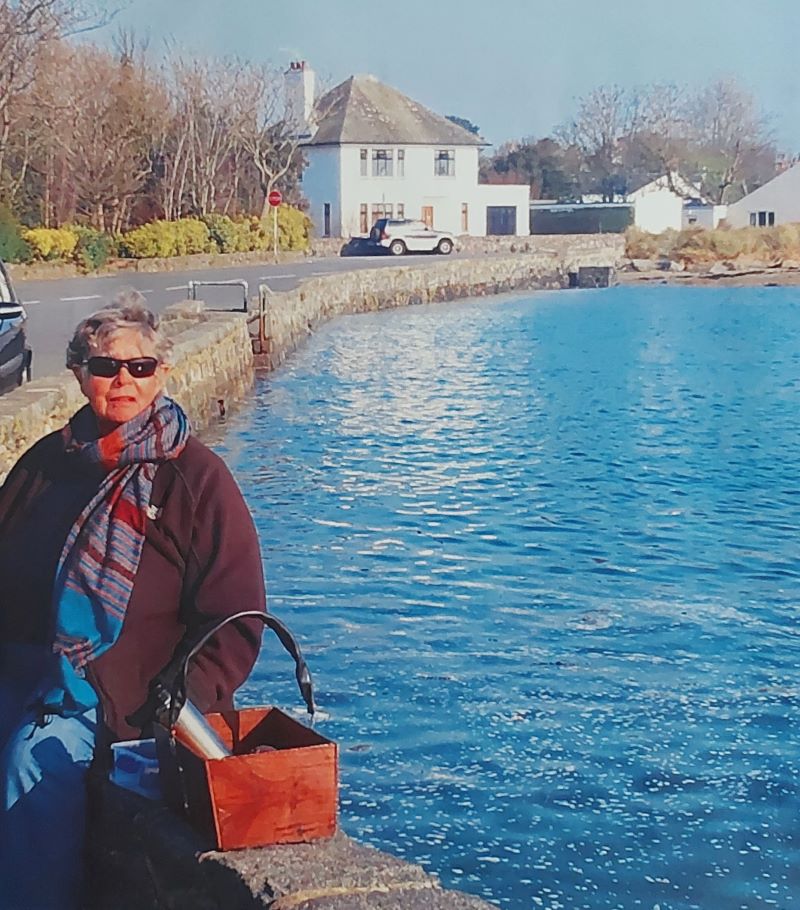
Pictured: José Day at Bordeaux with La Platte in the background - the home of her father, Louis, and mother, Queenie, and where she grew up.
Mr Tough received the original diary from Mrs Day nearly three years ago. He has worked on it meticulously with publisher Steve Foote of Blue Ormer.
Mrs Day's mother, the late Queenie Guillemette, did not want the diary published during her lifetime.
"She did not like the diary" said Mrs Day. "She did not want to be reminded of the memories of it. It was not until many years after the Occupation that she came out with stories of just how it had affected her and my father."
Mrs Guillemette was nearly evacuated but withdrew to remain in the island with her husband, her father, who was a widower, and her father's elderly parents.
"My mother was due to be evacuated with the Vale School," said Mrs Day. "They were going to go [with some other relations] to be helpers with the Vale School.
"She was up there and a woman walked in absolutely in floods of tears with a little girl who was about six. There was no room for this woman to go – she didn’t have a ticket. But my mother said to her ‘you are going in my place – go home and get a suitcase and come back quickly’.
"The headmaster was furious with her and said ‘Queenie, you can’t do that’ but she insisted. She got in a sewage cart and went off as far as the Halfway, where they unloaded, picked up another lorry and hitchhiked into Town.
"She bumped into Jurat John Leale on the steps of the Royal Court and he asked her what on earth she was doing there when she was meant to have been evacuated and warned her 'Louis is going to be furious and really not pleased to see you’.
"Well, Louis was furious that she hadn’t gone. But she didn’t want to go. She didn’t want to leave Louis or her father – who was a widower – or Louis’ parents, who were very elderly and had a shop."

Pictured: Louis Guillemette's wife, Queenie, was nearly part of the Evacuation, but she remained in Guernsey with her husband and their story of living together through the Occupation is a key part of the diary published today.
Mrs Day is delighted that she agreed to publication. "I am thrilled," she said. "I couldn't imagine how it could possibly have turned out like this.
"I hope it is a contribution to the island's understanding of the Occupation. And I think it draws out my father's role and how he tried to go about things at a very, very difficult time.
"He was a level-headed man. He was almost always very calm. But this period changed him and affected his health later on - just the sheer stress of it all."
Sir de Vic is also delighted with The People's Messenger, which helps set the record straight about the role played during the Occupation by his grandfather, Sir Victor.
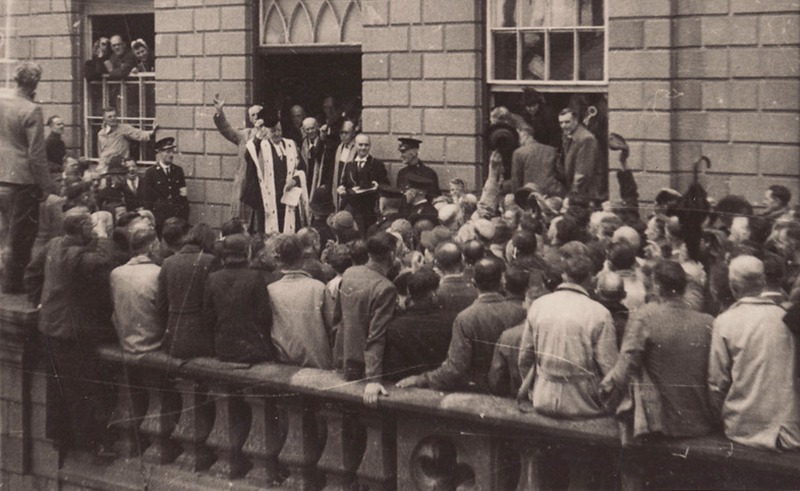
Pictured: Sir Victor Carey, Bailiff of Guernsey from 1935 to 1946, including the harsh years of the Occupation, is seen here celebrating the Liberation on the steps of the Royal Court. Credit: States of Guernsey.
Reading Mr Guillemette's words about Sir Victor, Sir de Vic said: "He never baulked at meeting the Germans and backing the rest of us when necessary and that trait has always endeared him to us.
"We always looked upon him as a good boss and he never forgot to be kind to those who worked for him."
Sir de Vic added: "It was for posterity that it was so necessary to have the records of this period kept. I had not realised this until quite recently, but my grandfather was very interested in ensuring that there was a record...clearly, Louis' diary adds a great deal to the record and our understanding of what happened."
The talk this evening is at the Duke of Richmond Hotel and is part of the Guernsey Literary Festival.

Pictured: Louis Guillemette's diary is the finest first-hand account ever published of the challenges which faced the island and those who remained during the Occupation.
Louis Guillemette OBE (1910-1977) was born in Guernsey and educated at the States’ Intermediate School and later was awarded a scholarship to Elizabeth College.
On leaving school, he joined the civil service of the States. At the outbreak of World War Two, he was Assistant Secretary to the Bailiff. When the States established the Controlling Committee in 1940, he was appointed Secretary to its President, a position which he held throughout the Occupation.
In 1948, he was promoted to States' Supervisor, the head of the civil service, and continued in this role until his retirement in 1975.
He was a keen sailor and talented musician.
He died of a heart attack aboard his beloved boat, Albatross, in 1977 at the age of 67.
Comments
Comments on this story express the views of the commentator only, not Bailiwick Publishing. We are unable to guarantee the accuracy of any of those comments.